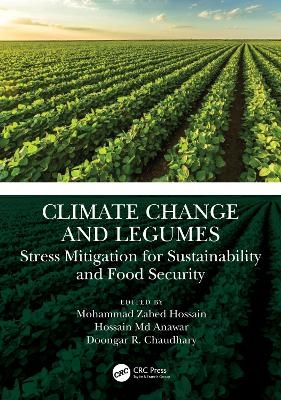
Climate Change and Legumes
CRC Press (Verlag)
978-1-032-07984-4 (ISBN)
Global climate change has created unprecedented challenges for human civilization due to its widespread adverse consequences, including a reduction in crop yield and threatening food security across the globe. Among the crop plants, legumes have great potential for ameliorating global warming since they can reduce carbon emissions by lowering reliance on the application of chemical fertilizers, by increasing nitrification and carbon sequestration in soil, and by providing protein-rich diets to both humans and livestock. This book identifies the extent of climate-induced stresses on legume plants and focuses on achieving food security through sustainable agricultural practices.
This book compiles recent research findings and reviews on climate-related problems, the potential of legumes in ameliorating the impacts of climate change, as well as better management of agricultural land and practices for achieving environmental sustainability and food security.
This book will serve as guidelines for scientists, agricultural practitioners, and policymakers working to achieve food security and better management of climate-induced stresses in agricultural interventions. It will also be useful as a reference book for researchers and students of both graduate and postgraduate levels. Furthermore, this book will provide enhanced knowledge about the mechanisms of yield and stress tolerance of legumes as well as developing climate-smart crops and improving cropping systems for a sustainable environment and food security.
Features of the book
Reviews trends of global climate change and its consequences for food security across the continents
Identifies the challenges and scopes of cultivating legumes in achieving food security in the context of global climate change
Focuses on the improvements of legume production through conservation approaches in agricultural practices and modern techniques, including omics-based breeding, biotechnology, genetic engineering, and rhizobium technology
Discusses the sustainable amelioration options for soils affected by climate-induced stresses
Cites examples of applications of rhizobium technologies in reducing greenhouse gas emission
Describes pathways associated with yield, resistance, and tolerance of legumes to climate-induced stresses
Mohammad Zabed Hossain
1 Legume plants in the context of global climate change: Challenges and scopes for environmental sustainability
2 Diversity in legume genetic resources for adaptation to climate stress
3 Diversity and distribution of legumes in Pakistan
4 Legume inoculants using rhizobia strains effective to reduce nitrous oxide emissions
5 Proteomics: aim at stress mitigation in soybean under flooding
6 Impact of high temperature stress and its alleviation in Fabaceae
7 Genetic improvements for development of a climate resilient food legume crops
8 Innovations in agronomic management for adaptation to climate change in legume cultivation
9 Sustainable amelioration options and strategy for salinity-impacted agricultural soils
10 Microbial populations and soil fertility in the coastal lands of India
11 Strategic solutions and futuristic challenges for cultivation of food legumes in India
12 Climate-induced droughts and its implications for legume crops
13 Implication of climate change on the productivity of legumes
| Erscheinungsdatum | 17.07.2023 |
|---|---|
| Zusatzinfo | 28 Tables, black and white; 11 Line drawings, color; 16 Line drawings, black and white; 9 Halftones, color; 2 Halftones, black and white; 20 Illustrations, color; 18 Illustrations, black and white |
| Verlagsort | London |
| Sprache | englisch |
| Maße | 178 x 254 mm |
| Gewicht | 840 g |
| Themenwelt | Technik ► Umwelttechnik / Biotechnologie |
| Weitere Fachgebiete ► Land- / Forstwirtschaft / Fischerei | |
| ISBN-10 | 1-032-07984-3 / 1032079843 |
| ISBN-13 | 978-1-032-07984-4 / 9781032079844 |
| Zustand | Neuware |
| Informationen gemäß Produktsicherheitsverordnung (GPSR) | |
| Haben Sie eine Frage zum Produkt? |
aus dem Bereich


